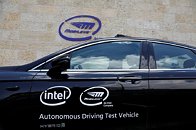Thursday, May 17th 2018

Intel's Mobileye Secures a Future-Focused Deal for 8 Million Self-Driving Systems in 2021
Intel's Mobileye, the AI and self-driving feature the blue giant acquired last year for a cool $15.3 billion, has just announced, via an exclusive report to Reuters, that they've secured a contract to provide some 8 million self-driving systems to an European automaker. The deal is a future-focused one, and will see, by 2021, distribution for Intel's EyeQ5 chip, which is designed for fully autonomous driving - an upgrade to the EyeQ4 that will be rolled out in the coming weeks, Reuters reports, according to senior vice president for advanced development and strategy at Mobileye Erez Dagan.
Amnon Shashua, Mobileye's chief executive, said that "By the end of 2019, we expect over 100,000 Level 3 cars [where the car is self-driving but still allows for user intervention should the system be unable to progress for more than 10 seconds] with Mobileye installed." This deal is sure to make Intel even more of a player in the automotive space, where NVIDIA and a number of other high-profile companies have been making strides in recent years.
Source:
Reuters
Amnon Shashua, Mobileye's chief executive, said that "By the end of 2019, we expect over 100,000 Level 3 cars [where the car is self-driving but still allows for user intervention should the system be unable to progress for more than 10 seconds] with Mobileye installed." This deal is sure to make Intel even more of a player in the automotive space, where NVIDIA and a number of other high-profile companies have been making strides in recent years.


12 Comments on Intel's Mobileye Secures a Future-Focused Deal for 8 Million Self-Driving Systems in 2021
As for the responsibility for a collision or death involving an AV is where things will get interesting, it will be very dependant on which vehicle is at fault in the incident and what the AV does, as the fault may well lie with the maker of the car if the car failed to recognise the cause of the crash. There is also talk of an altruism dial in the car, where you can decide how the car acts, where it tries to save you or save others in this scenario, which is certainly the most reasonable approach I can see to this dilemma for level 5 AV's certainly.
If the autonomous vehicles have a better driving record then typical human drivers then the human side of the equation becomes more of a liability. Also note that hit and runs should be zero with autonomous vehicles provide that they have proper collision detection. Whereas human drivers, likely committing additional crimes beyond the accident, tend to run to avoid prosecution.
I suspect that autonomous vehicles will still require that the operator / owner still have a license and insurance is an industry that simply isn't going away.
I don't have a pilot license but I have a brother that does and was in the air-force. According to him, one of the requirements to getting the pilot license was to be able to correct an out of control tale-spin. My point is that even if it seems unnecessary, for the sake of being capable in a dire situation sometimes the requirements make sense even if the don't seem to at first glance.
Generally speaking though, autonomous vehicles should probably require an occupant to take control if necessary. That means some level of alertness,.....
AV's should come with a full manual control option, that locks out drivers unless they attain a certain level of skill, "altruism" switches should be mandatory, although I doubt anyone would want to die instead of a stranger.
If some idiot decides to jay walk across a highway and expects me to die, forget it.
I enjoy driving too much to allow a vehicle dictate to me what is going to happen.
I don't "like driving", especially very long distances, would instead happily watch a movie or two.
Or even sleep in a driving car and get started at night on a 1000km+ trips.
But that only after tech matures, including addressing driving meatbags.